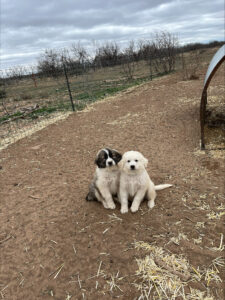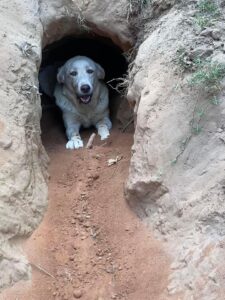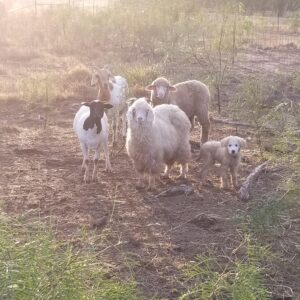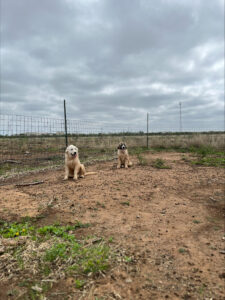
Maverick and Goose spending time together in the bonding pen. (Texas A&M AgriLife photo courtesy Saldana 2023)
Some much-needed rain has been falling across parts of West Central Texas, a welcoming site on the ranches that have received it. In some areas, this has led to the Texas winter grass going to seed with the warm weather we have also been having. While a valuable feed resource for livestock most of the year, this grass produces the dreaded “spear grass seeds” that burrow their way into the coats and soft skin of LGDs. These seeds can cause infections all over LGDs, but especially in their legs. Make sure to groom your dog’s regularly with de-shedding brushes during this time of year to help minimize the impact of the seeds on your dog’s health. Mats in long haired dog coats can often hide the seeds which can lead to lameness in your LGD and a costly vet bill to cure the infection!
AgriLife Livestock Guardian Dog Program: Events and Update
Our next online seminar will be on August 17th at 3 p.m. on Zoom. Check out our Facebook page for more information as the event gets closer. Dr. Katherine Lord will be returning to continue her discussion from November of 2022 on canine behavior and bonding. Do not miss this great presentation! The online seminar will be free as always. You can sign up on our events page.
The Texas LGD Association will be hosting its first annual LGD Field Day in Caldwell at the Burleson County Fairgrounds on June 10. Check out their Facebook Page for more information on the event and how to register. The event will consist of workshops on bonding LGDs with cattle, using LGDs with poultry, GPS tracking, ranch fencing and a breeder panel. Vendors and LGD breeders will be on site as well. Contact bill.costanzo@ag.tamu.edu or call 325-657-7311 to register for the event.
Our 2nd Annual LGD Photo Contest will be held July 3-7 this year. The contest categories will be – Artistic, Publication Worthy, Cuteness, Puppies at Work, Dogs at Work. We will also have subcategories of sheep, goats, poultry, and other animals this year. Prizes will be awarded to the winners of each category. The contest is open worldwide, but only US residents will be receiving prizes this year. Check out our Facebook page for more information. Photos can be submitted via Facebook during the contest dates or emailed to me at bill.costanzo@ag.tamu.edu.
LGD FAQ’s
Last month we started a three-part article on frequently asked questions that producers submit when they contact our program about LGDs. Below is the second set of commonly asked questions and answers we provide.
- Are my grandkids safe around LGDs and are they good with children?
A: Most LGDs that are well socialized with people will be fine with children around, especially if the dogs are raised with the children.

Exceptionally large, deep hole dug by an LGD to stay cool. (Texas A&M AgriLife photo courtesy Smith 2023)
- Do all LGDs dig holes?
A: Yes, LGDs dig holes in the ground to find a cool spot to get away from the warm summer heat. Providing your dogs will a separate kids pool or water trough to lay in under a tree will help stop the digging.
- I have heard LGDs bark a lot all day. Is there a breed that barks less?
A: All LGD breeds bark to alert predators of their presence and to notify their owners. LGDs will bark at anything they sense is out of place or a threat to their charges. Some LGDs tend to bark more at certain times of the day when predators are most active. Young LGDs tend to bark more as they have not learned what is a threat to their livestock and what is not. Proper training is the key to keeping barking at a minimum.
- Do LGDs need training, or can I just place them out with my livestock?
A: All dogs need training! A LGD puppy has a collection of potential abilities which must be guided and shaped by you to be successful. Puppies will make mistakes, do stupid things during the adolescent months, and must be corrected, probably many times. Having an older mature dog is always helpful for young dogs to learn the ropes from. You will still need to help them by using management tools like escape-proof pens, leash and tether training, time with livestock, praise, and treats, and if necessary, stern corrections. LGDs will normally go through periods of chasing and rough play as they mature from 8-18 months of age. These phases do not mean that the pup is not going to work out as an LGD! You as the owner must provide extra management during this time to train your LGD in the behaviors that are expected.
- Are all LGD breeds predisposed to genetic health problems?
A: Yes, because all dogs, including LGD breeds, have heritable diseases and have the potential to develop certain health problems. LGDs are large breed dogs and are especially predisposed to Hip and Elbow Dysplasia.
- Are LGDs good with other pet dogs and ranch dogs?
A: LGDs are generally good with other ranch dogs and family pets they are raised with and acclimated to. However, they can be canine aggressive to strange dogs that they do not know. It’s important to reacclimate your LGDs to your herding dogs each time you use them to move your livestock. This will help decrease the chance of aggression.
-
Can I place my LGD puppy in with my livestock from the time I bring them home?
A: Your puppy should be in a bonding pen from the time you bring it home until about 6 months of age. There should be a safe space for the puppy to enter that has shelter and feed in case it is being bullied by any of the livestock. The puppy should have to leave the area to get fresh water and interact with the livestock. As often as possible, supervise the interactions of the puppy and livestock. Game cameras are a tremendous help with supervision. Reward correct behavior and correct unwanted behavior immediately. All positive interactions should happen with the livestock, take the time to pet, groom and train the puppy for fifteen to twenty minutes, three to four days a week while it is with the livestock.
- How old does my LGD pup have to be before it is an effective guardian for my livestock?
A: LGDs are not fully effective until they are full grown, mature guardians at 18-24 months of age. Some breeds may not fully mature until 30 months of age.
Bonding Project Update
All the pups except for Maverick and Goose ended up having issues last month with chewing on ears and legs of young lambs and kids. We
removed all the young animals and left only mature livestock in the bonding pens. We have decided to return the lambs and kids to the bonding pastures once the puppies are released from the bonding pens in early July. We have also purchased a remote cellular based video camera to be able to monitor the puppies in the pens 24 hours a day. The unit has live video feed along with a bright light and two-way voice capability. We will keep you updated on how the system is working next month.
The sixteen dogs in Round 4 of the bonding project funded by the NSIIC grant will all graduate in the middle of June from the program. All producers have seen increased lamb crops after using dogs. Some had lamb crops as low as 20% before the dogs. All ranches using the dogs have over 100% lamb crop after having the dogs out working for only 8-10 months so far.

LGD Betty from Round 4 of the bonding project at a cooperating producers ranch near Juno, TX. (Texas A&M AgriLife photo courtesy Costanzo 2023)
In closing
If you enjoyed this monthly LGD blog, please don’t forget to subscribe to it with this link The Guardian Way | Texas A&M AgriLife Research and Extension Center at San Angelo.
To provide feedback on this article or request topics for future articles, please contact me at bill.costanzo@ag.tamu.edu or 325-657-7311.
The Texas A&M AgriLife Livestock Guardian Dog Program is a cooperative effort by Texas A&M AgriLife Research and the Texas Sheep and Goat Predator Management Board. Make sure to follow us on our social media sites and share them with your friends and family!
Facebook: https://www.facebook.com/TAMUlivestockguarddog/
Instagram: @tamulivestockguarddog
YouTube: https://www.youtube.com/channel/UCF7YbP6bNDV7___6H8mifBA
Do not forget to check out the Texas LGD Association online! Follow the organization at https://www.facebook.com/TexasLGDAssociation or check out their website!






